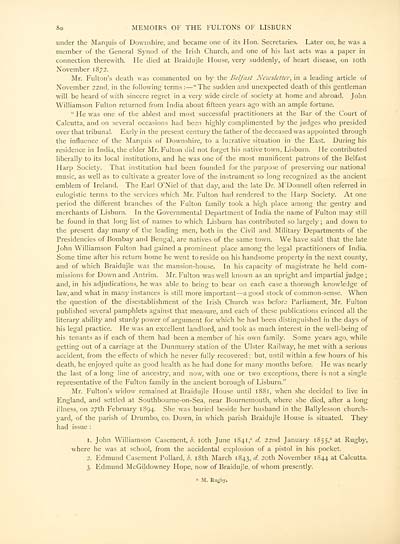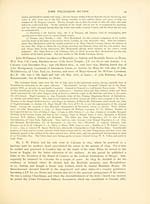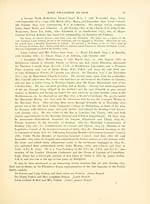Memoirs of the Fultons of Lisburn
(86) Page 80
Download files
Complete book:
Individual page:
Thumbnail gallery: Grid view | List view

So MEMOIRS OF THE FULTONS OF LISBURN
under the Marquis of Downshire, and became one of its Hon. Secretaries. Later on, he was a
member of the General Synod of the Irish Church, and one of his last acts was a paper in
connection therewith. He died at Braidujle House, very suddenly, of heart disease, on ioth
November 1872.
Mr. Fulton's death was commented on by the Belfast Neioslcttcr, in a leading article of
November 22nd, in the following terms : — "The sudden and unexpected death of this gentleman
will be heard of with sincere regret in a very wide circle of society at home and abroad. John
Williamson Fulton returned from India about fifteen years ago with an ample fortune.
" He was one of tlie ablest and most successful practitioners at the Bar of the Court of
Calcutta, and on several occasions had been highly complimented by the judges who presided
over that tribunal. Early in the present century the father of the deceased was appointed through
the influence of the Marquis of Downshire, to a lucrative situation in the East. During his
residence in India, the elder Mr. Fulton did not forget his native town, Lisburn. He contributed
liberally to its local institutions, and he was one of the most munificent patrons of the Belfast
Harp Society. That institution had been founded for the purpose of preserving our national
music, as well as to cultivate a greater love of the instrument so long recognized as the ancient
emblem of Ireland. The Earl O'Niel of that day, and the late Dr. M'Donnell often referred in
eulogistic terms to the services which Mr. Fulton had rendered to the Harp Society. At one
period the different branches of the Fulton family took a high place among the gentry and
merchants of Lisburn. In the Governmental Department of India the name of Fulton may still
be found in that long list of names to which Lisburn has contributed so largely ; and down to
the present day many of the leading men, both in the Civil and Military Departments of the
Presidencies of Bombay and Bengal, are natives of the same town. We have said that the late
John Williamson Fulton had gained a prominent place among the legal practitioners of India.
Some time after his return home he went to reside on his handsome property in the next county,
and of which Braidujle was the mansion-house. In his capacity of magistrate he held com-
missions for Down and Antrim. Mr. Fulton was well known as an upright and impartial judge ;
and, in his adjudications, he was able to bring to bear on each case a thorough knowledge of
law, and what in many instances is still more important — a good stock of common-sense. When
the question of the disestablishment of the Irish Church was before Parliament, Mr. Fulton
published several pamphlets against that measure, and each of these publications evinced all the
literary ability and sturdy power of argument for which he had been distinguished in the days of
his legal practice. He was an excellent landlord, and took as much interest in the well-being of
his tenants as if each of them had been a member of his own family. Some years ago, while
getting out of a carriage at the Dunmurry station of the Ulster Railway, he met with a serious
accident, from the effects of which he never fully recovered; but, until within a few hours of his
death, he enjoyed quite as good health as he had done for many months before. Fie was nearly
the last of a long line of ancestry, and now, with one or two exceptions, there is not a single
representative of the Fulton family in the ancient borough of Lisburn."
Mr. F"ulton's widow remained at Braidujle House until 1881, when she decided to live in
England, and settled at Southbourne-on-Sea, near Bournemouth, where she died, after a long
illness, on 27th February 1894. She was buried beside her husband in the Ballylesson church-
yard, of the parish of Drumbo, co. Down, in which parish Braidujle House is situated. They
had issue :
1. John Williamson Casement, b. ioth June 1841," d. 22nd January iS55, a at Rugby,
where he was at school, from the accidental explosion of a pistol in his pocket.
2. Edmund Casement Pollard, b. 18th March 1843, d. 20th November 1S44 at Calcutta.
3. Edmund McGildowney Hope, now of Braidujle, of whom presently.
» M. Rugby.
under the Marquis of Downshire, and became one of its Hon. Secretaries. Later on, he was a
member of the General Synod of the Irish Church, and one of his last acts was a paper in
connection therewith. He died at Braidujle House, very suddenly, of heart disease, on ioth
November 1872.
Mr. Fulton's death was commented on by the Belfast Neioslcttcr, in a leading article of
November 22nd, in the following terms : — "The sudden and unexpected death of this gentleman
will be heard of with sincere regret in a very wide circle of society at home and abroad. John
Williamson Fulton returned from India about fifteen years ago with an ample fortune.
" He was one of tlie ablest and most successful practitioners at the Bar of the Court of
Calcutta, and on several occasions had been highly complimented by the judges who presided
over that tribunal. Early in the present century the father of the deceased was appointed through
the influence of the Marquis of Downshire, to a lucrative situation in the East. During his
residence in India, the elder Mr. Fulton did not forget his native town, Lisburn. He contributed
liberally to its local institutions, and he was one of the most munificent patrons of the Belfast
Harp Society. That institution had been founded for the purpose of preserving our national
music, as well as to cultivate a greater love of the instrument so long recognized as the ancient
emblem of Ireland. The Earl O'Niel of that day, and the late Dr. M'Donnell often referred in
eulogistic terms to the services which Mr. Fulton had rendered to the Harp Society. At one
period the different branches of the Fulton family took a high place among the gentry and
merchants of Lisburn. In the Governmental Department of India the name of Fulton may still
be found in that long list of names to which Lisburn has contributed so largely ; and down to
the present day many of the leading men, both in the Civil and Military Departments of the
Presidencies of Bombay and Bengal, are natives of the same town. We have said that the late
John Williamson Fulton had gained a prominent place among the legal practitioners of India.
Some time after his return home he went to reside on his handsome property in the next county,
and of which Braidujle was the mansion-house. In his capacity of magistrate he held com-
missions for Down and Antrim. Mr. Fulton was well known as an upright and impartial judge ;
and, in his adjudications, he was able to bring to bear on each case a thorough knowledge of
law, and what in many instances is still more important — a good stock of common-sense. When
the question of the disestablishment of the Irish Church was before Parliament, Mr. Fulton
published several pamphlets against that measure, and each of these publications evinced all the
literary ability and sturdy power of argument for which he had been distinguished in the days of
his legal practice. He was an excellent landlord, and took as much interest in the well-being of
his tenants as if each of them had been a member of his own family. Some years ago, while
getting out of a carriage at the Dunmurry station of the Ulster Railway, he met with a serious
accident, from the effects of which he never fully recovered; but, until within a few hours of his
death, he enjoyed quite as good health as he had done for many months before. Fie was nearly
the last of a long line of ancestry, and now, with one or two exceptions, there is not a single
representative of the Fulton family in the ancient borough of Lisburn."
Mr. F"ulton's widow remained at Braidujle House until 1881, when she decided to live in
England, and settled at Southbourne-on-Sea, near Bournemouth, where she died, after a long
illness, on 27th February 1894. She was buried beside her husband in the Ballylesson church-
yard, of the parish of Drumbo, co. Down, in which parish Braidujle House is situated. They
had issue :
1. John Williamson Casement, b. ioth June 1841," d. 22nd January iS55, a at Rugby,
where he was at school, from the accidental explosion of a pistol in his pocket.
2. Edmund Casement Pollard, b. 18th March 1843, d. 20th November 1S44 at Calcutta.
3. Edmund McGildowney Hope, now of Braidujle, of whom presently.
» M. Rugby.
Set display mode to:
![]() Universal Viewer |
Universal Viewer | ![]() Mirador |
Large image | Transcription
Mirador |
Large image | Transcription
Images and transcriptions on this page, including medium image downloads, may be used under the Creative Commons Attribution 4.0 International Licence unless otherwise stated. ![]()
| Histories of Scottish families > Memoirs of the Fultons of Lisburn > (86) Page 80 |
|---|
| Permanent URL | https://digital.nls.uk/95604169 |
|---|
| Description | A selection of almost 400 printed items relating to the history of Scottish families, mostly dating from the 19th and early 20th centuries. Includes memoirs, genealogies and clan histories, with a few produced by emigrant families. The earliest family history goes back to AD 916. |
|---|

